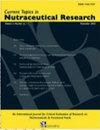Effect of Simultaneous Intake of Medium-Chain Triglyceride and d-Allulose on Body Fat Accumulation in Rats Fed a High-Fat Diet
IF 0.4
4区 医学
Q4 NUTRITION & DIETETICS
Current Topics in Nutraceutical Research
Pub Date : 2023-07-07
DOI:10.37290/ctnr2641-452x.21:242-247
引用次数: 0
Abstract
Medium-chain triglycerides, lipids containing three 6−12 carbon medium-chain fatty acids, have antiobesity effects because they do not promote lipogenesis. d-Allulose, a low-calorie epimer of fructose commercially used as a low-calorie sweetener, suppresses hepatic lipogenesis and enhances postprandial fat oxidation. Therefore, we have explored whether a simultaneous intake of medium-chain fatty acids and d-allulose may exhibit a greater reduction in de novo lipogenesis and increase their antiobesity effects. To this end, 32 male Wistar rats were divided into four treatment groups of equal sizes: control, 3% d-allulose-treated, 5% medium-chain triglycerides-treated, and 3% d-allulose + 5% medium-chain triglycerides-treated. After 8 weeks of ad libitum exposure to these diets, d-allulose significantly decreased intra-abdominal adipose tissue and total body fat weight, with or without medium-chain triglyceride supplementation. The antiobesity effect of d-allulose was observed with or without dietary medium-chain triglyceride supplementation in high-fat diet-induced obese rats, but no synergistic effect was detected between d-allulose and medium-chain triglycerides.同时摄入中链甘油三酯和d-Allulose对高脂饮食大鼠体脂积累的影响
中链甘油三酯,即含有3个6 - 12碳中链脂肪酸的脂质,具有抗肥胖作用,因为它们不促进脂肪生成。d-Allulose是果糖的一种低热量表聚体,商业上用作低热量甜味剂,可抑制肝脏脂肪生成并促进餐后脂肪氧化。因此,我们探索了同时摄入中链脂肪酸和d-allulose是否能更大程度地减少脂肪的新生形成,并增加它们的抗肥胖作用。为此,将32只雄性Wistar大鼠分为4个大小相等的处理组:对照组、3% d-allulose处理组、5%中链甘油三酯处理组和3% d-allulose + 5%中链甘油三酯处理组。在随意暴露于这些饮食8周后,无论是否补充中链甘油三酯,d-allulose都显著降低了腹腔内脂肪组织和全身脂肪重量。在高脂饮食诱导的肥胖大鼠中,在添加或不添加中链甘油三酯的情况下观察d-allulose的抗肥胖作用,但d-allulose与中链甘油三酯之间没有协同作用。
本文章由计算机程序翻译,如有差异,请以英文原文为准。
求助全文
约1分钟内获得全文
求助全文
来源期刊
CiteScore
1.10
自引率
0.00%
发文量
36
审稿时长
>12 weeks
期刊介绍:
Current Topics in Nutraceutical Research is an international, interdisciplinary broad-based peer reviewed scientific journal for critical evaluation of research on chemistry, biology and therapeutic applications of nutraceuticals and functional foods. The major goal of this journal is to provide peer reviewed unbiased scientific data to the decision makers in the nutraceutical and food industry to help make informed choices about development of new products.
To this end, the journal will publish two types of review articles. First, a review of preclinical research data coming largely from animal, cell culture and other experimental models. Such data will provide basis for future product development and/or human research initiatives. Second, a critical evaluation of current human experimental data to help market and deliver the product for medically proven use. This journal will also serve as a forum for nutritionists, internists, neurologists, psychiatrists, and all those interested in preventive medicine.
The common denominator of all of the topic to be covered by the journal must include nutraceuticals and/functional food. The following is an example of some specific areas that may be of interest to the journal. i) Role of vitamins, minerals, antioxidants and phytonutrients on cardiovascular health, cancer, diabetes, ocular health, mental health, men’s health, women’s health, infant nutrition, ii) Role of herbals on human health, iii) Dietary supplements and sleep, iv) Components of diet that may have beneficial effect on human health, v) regulation of apoptosis and cell viability, vi) Isolation and characterization of bioactive components from functional foods, vii) Nutritional genomics, and viii) Nutritional proteomics.

 求助内容:
求助内容: 应助结果提醒方式:
应助结果提醒方式:


